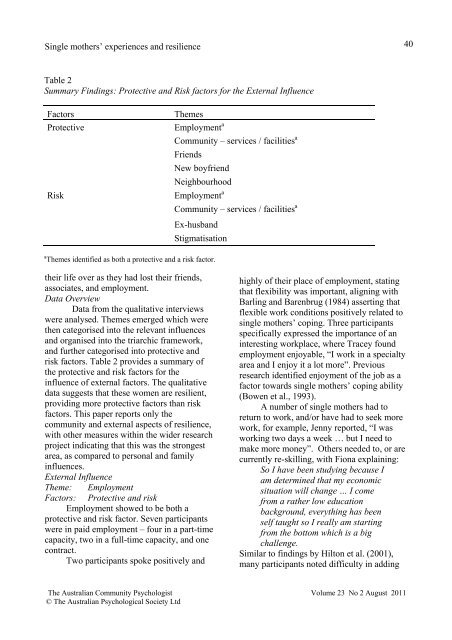The Australian Community Psychologist - APS Member Groups
The Australian Community Psychologist - APS Member Groups
The Australian Community Psychologist - APS Member Groups
You also want an ePaper? Increase the reach of your titles
YUMPU automatically turns print PDFs into web optimized ePapers that Google loves.
Single mothers’ experiences and resilience<br />
40<br />
Table 2<br />
Summary Findings: Protective and Risk factors for the External Influence<br />
Factors<br />
Protective<br />
Risk<br />
<strong>The</strong>mes<br />
Employment a<br />
<strong>Community</strong> – services / facilities a<br />
Friends<br />
New boyfriend<br />
Neighbourhood<br />
Employment a<br />
<strong>Community</strong> – services / facilities a<br />
Ex-husband<br />
Stigmatisation<br />
a <strong>The</strong>mes identified as both a protective and a risk factor.<br />
their life over as they had lost their friends,<br />
associates, and employment.<br />
Data Overview<br />
Data from the qualitative interviews<br />
were analysed. <strong>The</strong>mes emerged which were<br />
then categorised into the relevant influences<br />
and organised into the triarchic framework,<br />
and further categorised into protective and<br />
risk factors. Table 2 provides a summary of<br />
the protective and risk factors for the<br />
influence of external factors. <strong>The</strong> qualitative<br />
data suggests that these women are resilient,<br />
providing more protective factors than risk<br />
factors. This paper reports only the<br />
community and external aspects of resilience,<br />
with other measures within the wider research<br />
project indicating that this was the strongest<br />
area, as compared to personal and family<br />
influences.<br />
External Influence<br />
<strong>The</strong>me: Employment<br />
Factors: Protective and risk<br />
Employment showed to be both a<br />
protective and risk factor. Seven participants<br />
were in paid employment – four in a part-time<br />
capacity, two in a full-time capacity, and one<br />
contract.<br />
Two participants spoke positively and<br />
highly of their place of employment, stating<br />
that flexibility was important, aligning with<br />
Barling and Barenbrug (1984) asserting that<br />
flexible work conditions positively related to<br />
single mothers’ coping. Three participants<br />
specifically expressed the importance of an<br />
interesting workplace, where Tracey found<br />
employment enjoyable, “I work in a specialty<br />
area and I enjoy it a lot more”. Previous<br />
research identified enjoyment of the job as a<br />
factor towards single mothers’ coping ability<br />
(Bowen et al., 1993).<br />
A number of single mothers had to<br />
return to work, and/or have had to seek more<br />
work, for example, Jenny reported, “I was<br />
working two days a week … but I need to<br />
make more money”. Others needed to, or are<br />
currently re-skilling, with Fiona explaining:<br />
So I have been studying because I<br />
am determined that my economic<br />
situation will change … I come<br />
from a rather low education<br />
background, everything has been<br />
self taught so I really am starting<br />
from the bottom which is a big<br />
challenge.<br />
Similar to findings by Hilton et al. (2001),<br />
many participants noted difficulty in adding<br />
<strong>The</strong> <strong>Australian</strong> <strong>Community</strong> <strong>Psychologist</strong> Volume 23 No 2 August 2011<br />
© <strong>The</strong> <strong>Australian</strong> Psychological Society Ltd

















